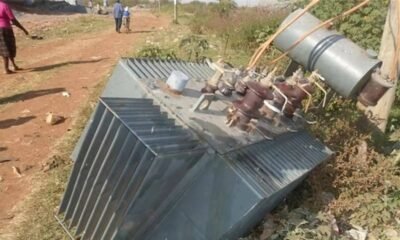Business
Manufacturers Call For FG Help Over Gas Consumption Costs

BY CAMI EZENWA
Manufacturers in Nigeria currently groaning under rising gas consumption levels in an era of COVID-19, have called on the federal government for help.
The National Chairman of Non Metallic Mining Group of the Manufacturers Association of Nigeria (MAN), Mr. Afam Mallinson Ukatu, who made the call, said incessant power outage was worsening their lot in the economy.
“In 2019, we were advised not to pay the actual gas bills that the government has given some incentives to some sectors like the textile sector. So we asked a question, why was textile the only considered sector while there are other sectors that are purely producing made in Nigeria goods which are neglected.
“However, as we speak, the textile sector has even gotten that discount. I am amazed that the government who is supposed to be encouraging us in other to employ more people is behaving this way. This is however a deterrent to intending investors,” he sressed.
On current realities occasioned by COVID-19, he said although the pandemic was not peculiar to Nigeria but that the brunt had been harsher.
“ I expected the government to give palliative to manufacturers to cushion the resultant effect of the pandemic instead of the commodity price going up.
“We have been complaining that we are being charged in Dollar for consuming gas locally and nothing has been done to reverse the ugly trend.
“ I have been complaining about this over the years at the parent organisation (MAN) for a very long time that the trend should be reversed and also for the government to look into it.
“It is very painful that gas, which is gotten from our soil is being sold to us in US Dollars.

“We are being charged according to the exchange rates. Now that the exchange rate has gone, following the technical devaluation of the Naira, and scarcity of Forex, the increase has come again when we are asking for what palliative the government should give us to ameliorate our situation, and to enable us pay salaries, gas bills and offset some bill that accumulated during the lockdown.
“We were also looking at the government to give us some relief for one year or more, but what we are getting is increased gas price. This is not done in any part of the world, it is only in Nigeria that this is happening and it is quite unfortunate.’
He pointed out that in addition to the effects of the virus, that manufacturers were facing price spirals from two critical angles – point of view of cost of production and movement of raw materials from mining site to the factory, blaming these on difficulty in accessing roads due to the rainy season.
According to him, the current price of gas had pushed the cost of production up by over 30 over percent, leading to daily losses running into millions by manufactures.
According to Dr. Micheal Adebayo, Chairman, Oil and Gas Sectoral Group of MAN, the sector is working in collaboration with the Federal Government to revert the payment of gas consumed locally from Dollar to Naira.
Adebayo noted that the government has set up a committee to hamonise the Petroleum Industry Bill (PIB) as gas pricing for local consumption has been included in the PIB.
READ ALSO: Revisiting The Overpopulation Myth In Light Of The Pandemic
He pointed out that the delay experienced is to amend it once and for all, emphasizing that the bill is at the stage of becoming a legal document which would likely be passed into law and possibly implemented before the end of 2020.
He said; “The government is working to make sure that gas is available for domestic consumption at all times and must be sold in Naira.
“Before the end of 2020, the PIB must have been implemented and once this is done, we would enjoy maximum benefit and the nation’s economy would experience boom, because more consumers of gas would emerge and gas would become more relevant to the Nigerian economy that oil.”



























